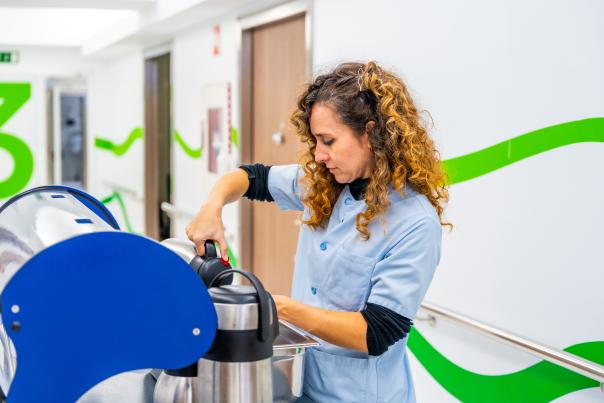
In a bid to eliminate hospital acquired (nosocomial) infections, various objects have been investigated as breeding grounds for bacteria including coffee machines, doctors’ ties and even hospital Bibles.
Now researchers in Germany have assessed the microbial population in coffee machines on healthcare-related premises, with a focus on the World Health Organisation’s (WHO) high priority ‘ESKAPE’ pathogens (Enterococcus faecium, Staphylococcus aureus, Klebsiella pneumoniae, Acinetobacter baumannii, Pseudomonas aeruginosa, and Enterobacter species).
These bacteria are seen by WHO as posing an increasing threat because they are resistant to many antibiotics and can lead to fatal bloodstream or catheter associated infections.
From 31 October to 31 December 2022 the researchers swabbed a total of 25 coffee makers. Seventeen were from break rooms and offices at a university hospital’s department and eight were in staff members’ homes.
There was no current disease outbreak at any of the locations at the time of sampling and the coffee machines were not specifically cleaned before sampling. Each of the coffee makers was swabbed at five specific points – which were the drip tray, outlet, buttons, the water tank handle, as well as inside of the water tank.
Typical pathogens were grouped into ‘medically relevant’ and commensals into ‘atypical pathogens’ and differentiated by Gram type: positive or negative (the latter have an outer membrane, which aids antibiotic resistance).
Microbial growth was detected on every coffee machine and hospital machines were about three times as heavily colonised (360 strains isolated from 72 positive swabs) as home machines (135 strains isolated from 34 positive swabs).
The most commonly detected species were commensals (bacteria that live on the skin or in the gut and pose no threat to health). Only a few medically relevant, and no antibiotic-resistant, pathogens were identified.
Among the eight types of medically-relevant Gram negative species detected, 81% were found in coffee makers at the hospital, mainly collected from drip trays, outlets, and water tank handles, emphasising the need to follow hand hygiene protocols.
Staphylococcus aureus was the only possibly Gram positive disease causing species collected: once on the buttons of a home coffee maker and once on the inside of a water tank at the hospital, suggesting that users’ hands touch even unlikely parts of the machines.
The authors of the study concluded: “To our great relief, despite their potential for pathogen origins in nosocomial outbreaks, a general ban on coffee makers doesn’t seem necessary.
“Our thoughts now turn to tea drinking nations. Are teapots, kettles, and hot water spouts similar breeding grounds for bacteria? Are the high temperatures in the pots sufficient to kill all potential pathogens? And what about the handles?”